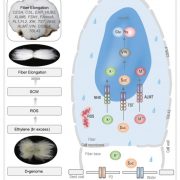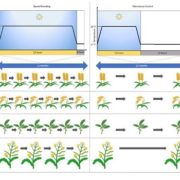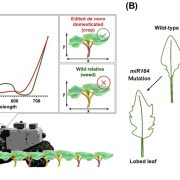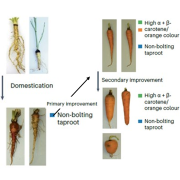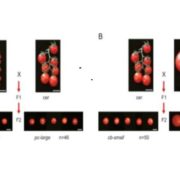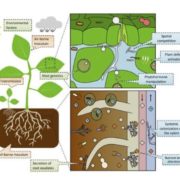Breaking the breeding cycle: Parthenogenesis paves the way for faster sunflower breeding
 Hybrid crops are key to modern agriculture, offering higher yields, improved stress resilience, and greater uniformity through heterosis (“hybrid vigor”), where offspring from two different inbred lines outperform their parents. However, producing homozygous inbred lines for stable hybrid seed production traditionally takes at least six generations of self-pollination, slowing breeding progress. Doubled haploid (DH) technology offers a faster solution by generating homozygous lines in a single generation through haploid embryo formation and genome doubling. While DH systems are established in maize, their use in other crops has been limited by inefficiency and genotype dependence. In a serendipitous discovery, Lv et al. found that sunflower (Helianthus annuus) can produce haploid embryos spontaneously through parthenogenesis, which is when embryos form from unfertilized eggs.. Testing a chemical method used in maize to induce haploids, they observed viable seeds on emasculated, unpollinated sunflower plants. These seeds germinated into plants with smaller leaves and reduced stomatal size, confirming they were true haploids from unfertilized egg cells. Genetic analysis confirmed these seeds were maternally derived, lacking paternal DNA. By combining chemical emasculation, high-intensity light to stimulate parthenogenesis, and genome doubling, they developed a highly efficient, non-transgenic DH pipeline, reducing breeding timelines from six years to just ten months. This breakthrough not only accelerates sunflower breeding plans but also opens the door to transferring DH technology across species. Understanding the genetic and cellular mechanisms behind this process could eventually allow parthenogenesis to be induced in other crops, revolutionizing plant breeding and accelerating crop improvement. (See also the News and Views by Todesco and Reisburg 10.1038/d41586-025-00904-8) (Summary by Gourav Arora @gourav_arora_g) Nature 10.1038/s41586-025-08798-2
Hybrid crops are key to modern agriculture, offering higher yields, improved stress resilience, and greater uniformity through heterosis (“hybrid vigor”), where offspring from two different inbred lines outperform their parents. However, producing homozygous inbred lines for stable hybrid seed production traditionally takes at least six generations of self-pollination, slowing breeding progress. Doubled haploid (DH) technology offers a faster solution by generating homozygous lines in a single generation through haploid embryo formation and genome doubling. While DH systems are established in maize, their use in other crops has been limited by inefficiency and genotype dependence. In a serendipitous discovery, Lv et al. found that sunflower (Helianthus annuus) can produce haploid embryos spontaneously through parthenogenesis, which is when embryos form from unfertilized eggs.. Testing a chemical method used in maize to induce haploids, they observed viable seeds on emasculated, unpollinated sunflower plants. These seeds germinated into plants with smaller leaves and reduced stomatal size, confirming they were true haploids from unfertilized egg cells. Genetic analysis confirmed these seeds were maternally derived, lacking paternal DNA. By combining chemical emasculation, high-intensity light to stimulate parthenogenesis, and genome doubling, they developed a highly efficient, non-transgenic DH pipeline, reducing breeding timelines from six years to just ten months. This breakthrough not only accelerates sunflower breeding plans but also opens the door to transferring DH technology across species. Understanding the genetic and cellular mechanisms behind this process could eventually allow parthenogenesis to be induced in other crops, revolutionizing plant breeding and accelerating crop improvement. (See also the News and Views by Todesco and Reisburg 10.1038/d41586-025-00904-8) (Summary by Gourav Arora @gourav_arora_g) Nature 10.1038/s41586-025-08798-2


